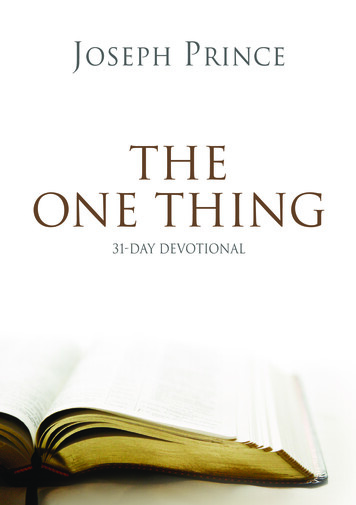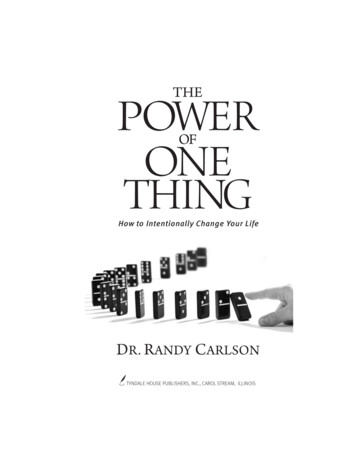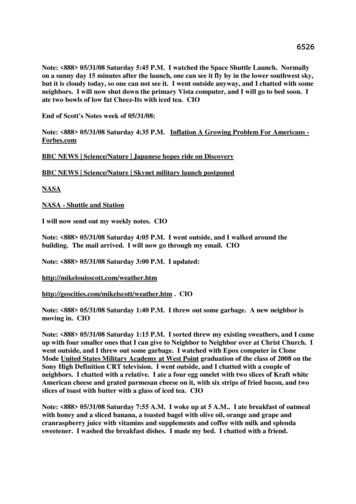
Transcription
ONETHINGYOUCAN’TdO INHeavenStudy Guide MARK CAHILL
hank you for your interest in learning how to share your faith!This study guide is being made available freely for those whowish to use One Thing You Can’t Do in Heaven for personal orgroup study.Covering Chapters 1 through 13 of the book, the study fits into a13-week time frame, making it ideal for a Sunday school quarterlyschedule.If you are reading the book on your own, the study questions willenhance your understanding of the book’s main principles and helpyou implement its practical ideas. Going through the material as agroup and discussing its concepts will help you to further build theseprinciples into your life—so you can live them out.An Answer Key is provided in the back, which contains possibleanswers as well as page numbers where the question content can befound. Whichever way you use this study, please take time to thoughtfully consider each question on your own before referring to theAnswer Key.May God bless you as you boldly reach the lost! You will not regretit here or on Judgment Day.TOne Thing You Can’t Do in Heaven Study Guide 2007 by Mark Cahill. All rights reserved. Permission is granted to reproduce this material for use instudying One Thing You Can’t Do in Heaven. This document is not to be displayed on other websites, redistributed, or sold without permission of the author. Please feel free to tell others about this study guide bydirecting them to www.markcahill.org.Produced as a companion to: One Thing You Can’t Do in Heaven (ISBN 978-0-9643665-8-9), published byBiblical Discipleship Publishers
QUESTIONSChapter 1: South Beach1. The typical mindset of Christians today is to invite the lost to church or to a Christian event—in otherwords, to have them “come to the light.” According to John 3:19,20, is this a reasonable expectation?What do you think of the idea of instead taking your light into the darkness? Which do you think ismore effective, and why?2. From the Book of Acts, can you think of any verses where believers invited the lost to check out the services at their exciting new church? According to Scripture, where were believers when they shared thegospel with the lost? Why did the early Church behave this way (see Mark 16:15)?3. God has placed eternity in our hearts, so we know there is more to our existence than just this life. Howdoes this fact encourage you to begin talking about eternal things? In talking with non-Christians, haveyou seen evidence of this truth?4. Has anyone ever referred to you as an angel? If so, what were the circumstances? People usually use theterm to refer to someone who’s been especially helpful. However, “angel” actually means “messenger.” Inwhat sense could you rightfully be called an angel?5. Jesus instructed us to pray that “[God’s] will be done on earth as it isin heaven” (Matthew 6:10). We can do His will in heaven once we getthere, but what is His highest priority for us to accomplish whilewe’re still here? So in order for God to answer this prayer, to whomhas He given the responsibility to actually do His will on earth?“We shall have all eternityin which to celebrate ourvictories, but we have onlyone swift hour before thesunset in which to win them.”—ROBERT MOFFAT(SCOTTISH MISSIONARY TOSOUTH AFRICA) 3
ONE THING YOU CAN’T DOINH E AV E N6. Some people claim they’re exempt from witnessing because they don’t have “the gift of evangelism.”According to Ephesians 4:11,12, what is the role of the evangelist? Whose responsibility is it to witness?7. If evangelism isn’t a gift, but is simply a matter of obedience, then all believers have an equal ability. (SeeActs 1:8.) If you know people who witness, what do you think makes them good at it? What is the onlyway you’ll become good at it?8. Do you think Luke 12:12 and 2 Timothy 4:2 contradict or complement each other? (See also John14:26.) What do they say about what is our responsibility and what is God’s responsibility?Action Item: Think of someone you know who needs to hear the gospel, and begin praying for anopportunity to talk about spiritual matters. Be encouraged that when you step out in faith and do yourpart, God will do His. Chapter 2: GET To!1. Is your mindset more “got to” (perfunctory) or “GET to” (privilege) when it comes to attending church,praying, reading the Bible, giving, and worshiping? What about going to heaven? What can you do toimprove your mindset in each of these areas?2. What do you think motivates believers like those in China to value church services so highly that theywould sacrifice so much to attend? How does that differ from your attitude toward church?4
STUDY GUIDE — QUESTIONS3. One pastor compares lack of prayer to idolatry, saying, “Prayerlessness is an insult to God. Every prayerless day is a statement by a helpless individual, ‘I do not need God today.’” What does your prayer lifereflect about your view of God? It is a common temptation of Satan to make us give up the reading of the Word andprayer when our enjoyment is gone; as if it were of no use to read the Scriptures whenwe do not enjoy them, and as if it were no use to pray when we have no spirit of prayer.The truth is that in order to enjoy the Word, we ought to continue to read it, and theway to obtain a spirit of prayer is to continue praying. The less we read the Word ofGod, the less we desire to read it, and the less we pray, the less we desire to pray.—GEORGE MUELLER 4. A popular worship song says, “Here I am to worship, here I am to bow down, here I am to say thatYou’re my God.” It’s easy to worship God in a church sanctuary, surrounded by fellow believers. Howeasy is it for you to verbally tell unbelievers about God? Why do you think this is? Which would Godconsider to be true worship? Explain your answer.5. We tend to place a certain value on everyone we see. What factors influence the value you give people?How should remembering their value in God’s eyes affect your attitude toward them?6. If you were going to learn to fish, chances are good that you wouldn’t go to a desert. If your youth groupor church wanted to learn to fish for men, would you recommend going on a “retreat” away from themaddening crowds, or would you go to where the “fish” are? Why?5
ONE THING YOU CAN’T DOINH E AV E N7. Why do many Christians believe they must build relationships with people first and not witness tostrangers? Do you think this is because it’s more comfortable, or because it’s demonstrated in Scripture?Action Item: Reread Spurgeon’s quote at the beginning of the chapter, and reflect on how his willingness to endure hardship reveals the value he placed on souls. Which of those things are you willing toendure so that the lost may be saved? If you would rather let souls be damned than have someone scoffat you, take time to repent of your attitude and ask God to give you a compassion for the lost thatmatches Spurgeon’s. Chapter 3: Winning, Winning, Winning1. In your own words, explain the “winning, winning, winning” concept.2. This crucial concept will make all the difference in your motivation to witness. From 1 Peter 4:14 andLuke 6:22,23, list the negative things that could happen if you take a stand for the Lord. Identify a specificincident when one of these things happened to you. Then list the positive things that result. Thesepromised benefits are just as real as the negatives.3. Why do you think many Christians are more concerned about temporary rejection by men than theyare about eternal rewards from God?4. Does knowing that it’s a winning situation every time give you more boldness to witness? Why or why not?6
STUDY GUIDE — QUESTIONS5. Name some locations where people gather in your local area where you can go witnessing. Why arethese areas effective—and easy—places to witness?6. What do you think about Christians hanging around outside bars, or going to areas where there areprostitutes or homosexuals, to witness? Would your church approve? Would Jesus approve?7. Are there some people you would not want to witness to, because you think they’re too “sinful”? Howdoes your attitude compare to Jesus’?8. What is the only time we lose when it comes to sharing our faith? Who loses the most when we keepsilent about the Lord? So if you always want to be a “winner,” what should you do?Action Item: Follow the advice of 1 Peter 4:14, and make “Happy Hour” for the lost into a happy hourfor you. Go to where the lost are, and start a conversation about eternity. Chapter 4: Excuses, Excuses1. Many of us tend to fill up our week with church activities and feel that we’re pleasing God with ourservice. Attending meetings, serving on committees, and singing in the choir aren’t bad—as long as theydon’t distract us from obeying the Great Commission Jesus gave us. Compare the time you spend doingchurch-related activities with the time you spend sharing the gospel in an average month. Which areyou giving higher priority? Which will have a greater eternal significance?7
ONE THING YOU CAN’T DOINH E AV E N2. List all the reasons why you don’t share your faith. After reading this chapter, do you think any of thoseexcuses are valid in God’s eyes? Explain your answer.3. What’s the worst thing that can happen to you when you share your faith? What’s more likely to happen?4. Read John 1:35–46 and John 4:1–30,39–42. Once Andrew, Philip, and the Samaritan woman had metthe Savior, how much training did they need to tell others about Him? If you have trusted in the Lord,do you currently know enough to share your faith? Why or why not?5. Do you have friends who could say that you’re the only person whocares where they spend eternity? What does the poem “My Friend”say about true friendship?6. Some missions groups believe that no one should hear the gospeltwice before everyone has heard it once. Do you think this is a validview? Why or why not?“Consider as sin anyminute of life spent onsomething other thansaving souls for eternityfrom this world doomedto destruction.”—RICHARD WURMBRAND 7. Identify some of the ways people planted or watered seeds in your life before you understood the gospeland trusted in Jesus. How might your life be different if they had been too timid to speak up?8
STUDY GUIDE — QUESTIONS8. Based on 1 Peter 3:15, some Christians think they should wait until they are asked before sharing theirfaith. How many non-Christians have approached you to ask how to be saved? If 97–99% of Christiansrarely if ever share their faith, what can you conclude about this approach? (See Psalm 96:2.)9. Explain why we shouldn’t neglect witnessing because we “don’t know enough” to answer every question.Action Item: St. Francis of Assisi once said, “Preach the gospel at all times and when necessary usewords.” Compare this sentiment to what God tells us in Romans 10:13–17. Determine today to do whatGod says, and share the gospel verbally so people can hear and be saved. Chapter 5: Did You Get One of These?1. What are some of the benefits of using tracts?2. List some of the ways you can give out tracts.3. What’s a good question to ask as you hand out tracts? Why is it effective?4. What do you think of the idea of buying someone’s groceries, or paying someone to read a gospel tract?Would you be willing to do that? Why or why not?9
ONE THING YOU CAN’T DOINH E AV E N5. What impact do you think that would have on the individuals you’re trying to witness to?6. Aside from placing tracts in beer cases, can you think of other places to put tracts where lost people willfind them (e.g., mail them with bill payments)?Action Item: Check out the unique, intriguing tracts available at www.markcahill.org andwww.chick.com. Choose tracts that are biblically sound and intriguing or interesting for a lostperson to read. Then start planting the seeds of gospel truth in people to impact their lives for eternity. Chapter 6: If They’re Breathing, They Need Jesus1. Why do you think it’s essential that people be thinking about their eternal destination before they canplace their trust in Christ?2. Name some ways you can help people to think about their mortality and gain an eternal perspective,using examples from this chapter.3. How many friends and relatives have you shared the gospel with? How many strangers? If 87% of thosewho come to Christ were introduced through a friend, do you think it’s because our friends are morereceptive, or because we neglect to witness to strangers?10
STUDY GUIDE — QUESTIONS4. If you have lost friends whom you don’t witness to, whatwould you say to them on Judgment Day about why younever invited them to heaven?5. Can you think of any people for whom you are the onlyChristian they know? Does realizing this have any impacton your responsibility to witness to them? Why or why not?“Heaven is not here, it’s There. Ifwe were given all we wanted here,our hearts would settle for thisworld rather than the next. Godis forever luring us up and awayfrom this one, wooing us toHimself and His still invisibleKingdom, where we will certainlyfind what we so keenly long for.”—ELISABETH ELLIOT 6. Why do you think most people don’t want to commit theirlife to Christ? How can you convince them of the serious consequences of their decision?7. List the negative things that happened in Mark’s encounter with Michael Jordan. What’s the right perspective to have when things like this happen?8. Have you had anyone close to you die? How can pondering the reality—and the finality—of their fatedeepen your compassion for those who don’t know the Savior?Action Item: From the ideas given in this chapter, pick a couple of ways to get people talking abouteternity, and practice using them this week. Chapter 7: Say What?1. What’s a good way to transition to a spiritual topic, to pique the person’s curiosity?11
ONE THING YOU CAN’T DOINH E AV E N2. How can you use the survey approach to easily begin a spiritual conversation? What are some ways youcan implement this?3. Are you 100% sure that you’ll go to heaven? How would you explain the reason for your assurance tosomeone you’re witnessing to?4. Most people believe that doing good deeds will enable them to go to heaven. Name two analogies youcould use to help them understand that salvation is a gift and can’t be earned by good works.5. Rather than just launching into a gospel presentation with a stranger, why is it beneficial to first ask anyof the questions in this chapter, if you have time for a conversation?6. Many individuals wear something to express their personal views, and therefore won’t be offended whenyou ask them about it. What are some items that could spark a spiritual conversation, and what kinds ofquestions could you ask?7. What is a good survey approach that quickly identifies what someone’s values are? Why do you thinkthis is effective?8. Jesus used parables relating to fishing, farming, etc., to communicate spiritual truths in a way His listeners could understand. What similar “word pictures” you could use to explain what Jesus did for us?12
STUDY GUIDE — QUESTIONSAction Item: Do you wear something to express your beliefs? Whether you wear a cross around yourneck or not, we each should daily “wear” a cross (an instrument of death) to crucify our flesh. Thisweek, put to death your own desires and make sure you’re living for the One who died for you. Chapter 8: Guilty!1. What three things should you always be sure to talk about when witnessing, and why are they essential?2. The lost cannot understand what the “mark” is that they’ve missed, or feel personal conviction abouttheir sins, if we just cite a verse like Romans 3:23. What do they need to know in order to understandwhat sin is? (See 1 John 3:4.)3. What does the Bible say are the functions of the Moral Law? (See Psalm 19:7; Romans 3:19,20; 7:7.)4. Name the Ten Commandments, and briefly explain what they mean.“Before we can beginto see the cross assomething done for us,we have to see it assomething done by us.”—JOHN STOTT 13
ONE THING YOU CAN’T DOINH E AV E N5. Many Christians think the Moral Law has no place in evangelism, but what crucial purpose does itserve, according to Galatians 3:24? How does it achieve its purpose?6. How has God enabled all people in all places at all times to know right from wrong? (See Romans 2:15.)7. Using the Law in evangelism is not only effective, but it eliminates one of our greatest fears—the fear ofrejection. Why can you confidently use the Ten Commandments when witnessing, and not worry thatyou’ll offend people?8. If people think they’re good enough to go to heaven, how can you quickly help them see that they’renot? Walk through a sample conversation using the Moral Law.9. Ponder the last part of John Wesley’s quote on page 132. God did not intend that we share the gospel,the “good news” (God’s grace in sending a Savior to pay for our sin) before an individual understandsthe bad news (they’re guilty of sin and need a Savior). Does your church follow the biblical model ofusing the Law before grace? Why do you think most churches teach only half of the gospel message?10. When witnessing, why is it essential to explain the need for repentance? (See Luke 13:2,3; Acts 3:19.)14
STUDY GUIDE — QUESTIONSAction Item: Many faithful church members have never fully understood why they need the Savior—and therefore they may not actually have exercised “repentance toward God, and faith toward our LordJesus Christ” (Acts 20:20,21). Take time this week to ask several members of your church to explainhow they knew they needed to trust in Christ. Make sure they have the right answer. Chapter 9: Four Deadly Questions1. Reread Spurgeon’s quote at the beginning of the chapter. To what extent does your concern for soulsmatch Spurgeon’s? How much effort are you willing to expend to save one soul?2. Are you more comfortable with just quickly sharing the gospel, or with investing time to ask about people’s views? What can you gain by asking questions? What do you think you might risk?3. What should your attitude be as you ask these “four deadly questions”? Why is this important?4. What question can you ask to draw out more information about someone’s beliefs? Why is this helpfulto do?5. What can you ask to shift the burden of proof to the lost, encouraging them to provide evidence fortheir beliefs? What benefit does this serve?6. We all have opinions, but where our eternal destiny is concerned, our opinions should be based on fact.What can you ask to find out if people have done any “homework” before forming their views?15
ONE THING YOU CAN’T DOINH E AV E N7. You will often encounter moral relativity, where people think there is no absolute truth and all opinionsare equally valid. How can you help individuals realize that there can be right and wrong answers abouteternity?8. You can help people consider the eternal consequences of their decisions by asking, “What if you arewrong?” How would you respond if someone asked you, “What if you are wrong about Christianity?”Action Item: Where do you get your information? How do you know that what you believe is true? Justlike the lost you’re speaking with, make sure you have evidence to back up your beliefs. As a diligentworker, invest the necessary time to study God’s Word so you can explain what you believe and why, tohelp lead people to eternal life. Chapter 10: Good Answer!1. When individuals you’re talking with share their beliefs, what’s a good statement to use to help pointthem to the truth? What two scenarios can you present to demonstrate the reality of absolute truth?2. How could you prove to someone that there is a God? Based on this evidence, what could you concludeabout the respective faith of Christians and atheists?3. Christianity is based on the belief that God communicated His truths to us in the Bible. What fivepoints could you offer as evidence to convince someone that the Bible is truly the Word of God?16
STUDY GUIDE — QUESTIONS4. When you encounter people who believe that evolution disproves God, what four scientific facts couldyou share to show that evolution cannot be true?5. Jesus spoke more about hell than about heaven, warning people about it so they wouldn’t go there. Ifsomeone you’re talking with says he doesn’t believe in hell, how would you describe its reality? (SeeJesus’ words in Matthew 13:50; 25:46; Luke 16:23–28.)6. It’s very common for people to blame God when a loved one dies or something bad happens. Howcould you explain to them the real cause of suffering and death?7. Some individuals may try to paint God as “unfair” for punishing people in remote areas who haven’theard about Jesus. How can you redirect them so they think about their own accountability before God?8. Tragically, Satan is very effective in using the lives of hypocrites (Christian imposters) to turn peopleaway from Christianity. How would you answer those who point to hypocrites in the church as the reason they reject God?Action Item: Many lost people are planning on a “deathbed conversion.” They want to live their lifetheir way but still get into heaven. Take time to look through the obituaries in your local newspaperand note the ages of the deceased. No one knows how long they have on this earth. “Now is the day ofsalvation”—so go find someone to speak with today.17
ONE THING YOU CAN’T DOINH E AV E N Chapter 11: A Pocket Full of Tickets1. If you knew you would die and be standing before the Lord one week from now, how would you spendyour remaining time on earth? Be specific.2. Read 2 Corinthians 5:18–20. What do verses 18–19 say about the role that God has assigned us? If as Hisambassadors we refuse to speak as we have been entrusted to do, who are we actually silencing?3. What are the things that will matter to you on the day you die? In what ways do your current actionsreflect those priorities?4. People talk about what they love: their children, their hobby, their favorite sports team, etc. Based onwhat you talk about, what would people conclude are the things you love? Read Psalm 40:16. How canyou be more motivated to tell others about the Lord?5. If your friends went to the Super Bowl (or on a cruise), had extra prepaid tickets, and knew you wantedto go, how would you feel if they didn’t bother to invite you? What would you conclude about yourfriendship?6. Do you have unsaved friends or relatives who could die today and spend eternity in hell? If you haven’tyet offered them a ticket to heaven, what could they rightfully conclude about your concern for them?What can you do to ensure you don’t have a pocket full of tickets when you take your last breath?18
STUDY GUIDE — QUESTIONS7. It’s easy to say we love God, but the proof is in our actions. Based on how you spend your free time andyour resources, who would people say you love most? Explain.8. Knowing that God will test all of your works by fire, identify which of your actions are “gold, silver, andprecious stones” and which are “wood, hay, and stubble.” If you find you will be standing in a pile ofashes, what changes do you need to make?9. Read Luke 14:25–33. If Jesus says something three times, He wants to be absolutely sure His listenersdon’t miss a crucial point. What does He say is the cost of being a disciple? According to this passage,how well do you meet the qualifications of a true disciple of Jesus’?Action Item: Read this quote out loud and meditate on its meaning:“‘Not called!’ did you say? ‘Not heard the call,’ I think you should say. Put your ear down to theBible, and hear him bid you go and pull sinners out of the fire of sin. Put your ear down to the burdened, agonized heart of humanity, and listen to its pitiful wail for help. Go stand by the gates of hell,and hear the damned entreat you to go to their father’s house and bid their brothers and sisters, andservants and masters not to come there. And then look Christ in the face, whose mercy you have professed to obey, and tell him whether you will join heart and soul and body and circumstances in themarch to publish his mercy to the world.” —William BoothThis week, either “look Christ in the face” and tell Him you will refuse to obey His call, or commit inyour heart to follow Him and bring His good news to the lost. If you choose the latter, know that Hewill help you every step of the way. Chapter 12: Is There Not a Cause?1. What would you say is the greatest tragedy of all, in terms of consequences? If you’re guilty of playing apart in this tragedy, explain your role.19
ONE THING YOU CAN’T DOINH E AV E N2. Describe any persecution or hardship you’ve encountered as you’ve stood up for Christ. If you haven’tencountered any, do you think you should expect to? (See Philippians 1:29.) Why or why not?3. Have you experienced times when Satan seemed big and God seemed small? If so, describe the circumstances. How can you prevent this?4. Although we know the biblical truth that God is always with us, our behavior reveals whether we reallybelieve it. Do your actions show that you truly trust God to guide you while you’re sharing His messagewith the lost? Be honest, and explain your answer.5. When you’re witnessing to someone who claims to be a Christian, what should you do so it’s not a“wasted” encounter?6. What are some of the places where you hang out? What specific things could you do to “redeem thetime” while you are there?7. Have you had any conversations that seemed like divine appointments? If so, describe them. How doesthe thought that God may use you in answer to someone’s prayer affect your confidence and boldness?8. What are some examples of good news that you’ve shared with others (passing a test, etc.)? How dothose things compare to having all your sins forgiven and being granted eternal life in heaven? What canyou be doing to share the good news of Jesus more than you do?20
STUDY GUIDE — QUESTIONSAction Item: Mormons are required to devote two full years to the mission field, Jehovah’s Witnessesare diligently spreading their beliefs because their salvation depends on it, and celebrities are busyhawking their religious views. Only about 2% of Christians, who have the truth, are sharing the gospel.When lost people are searching for spiritual answers, who do you think they are more likely toencounter—and believe? Take a few minutes to pray about that, asking the Lord to use you in the harvest. Make it your goal to boldly speak God’s truth so people won’t fall for Satan’s lies. Chapter 13: Hit List1. If the moon just absorbed the light of the sun and suddenly stopped reflecting it, would you thinksomething was wrong? Why or why not? If you’re indwelt by the light of the world, how well are you fulfilling the function for which you were created?2. If you use posters, tracts, or other evangelism aids, what shouldyou be sure to include in the gospel message? Why?3. What do you think about the idea of trying to “talk someoneout of a decision for Christ”? Explain your reasoning. Is yourperspective based more on God’s Word or on man’s tradition?A pastor was asked, “Is it lawfulfor a Christian to smoke?”He answered, “It is altogetherwrong for a Christian to smoke:he must be on fire.”—RICHARD WURMBRAND 4. What is the role of the Holy Spirit in salvation, according to John 16:8? If we trust the Holy Spirit to doHis job, do we have to lead someone in a “prayer of salvation” in order for the person to be saved? (SeePsalm 51 for an example.) What’s the basis for your belief—Scripture or tradition?5. What reasons does Satan have to add your name to his “hit list”? Be honest in your evaluation. Wouldyou rather be in his cross-hairs because you’re standing up for the Lord, or not be a visible targetbecause you’re sitting down?21
ONE THING YOU CAN’T DOINH E AV E N6. According to one preacher, what are two reasons we’re here on earth? How are they interrelated?7. Why do people tend to think that sharing our faith is “radical”? Read Luke 17:7–10. According to theseverses, what is Jesus’ perspective?8. As God tells us through Ezekiel, it is our responsibility to warn sinners, regardless of whether they hearus or refuse the message. Is this difficult for you to do when you encounter “rejection”? If so, why? Howdoes your view compare with Jeremiah’s (see Jeremiah 25:3)?Action Item: Think of the people you have to thank for helping to bring you to the Lord. Do you thinkthey had to overcome any fears or hardships in talking to you about Jesus? If you’re glad they did, taketime to thank them for caring enough about you to be faithful. Then demonstrate your gratitude to theLord by boldly telling every lost soul you can about the only thing that matters—Jesus.22
ANSWER KEYChapter 1: South Beach1. The Bible tells us that sinners love the darkness and hate the light, and don’t want to come to the light.It’s not very likely that they’ll want to come to a Christian event or to a church service to worship a Godthey don’t believe in. So it would be more effective for Christians to each take our light to them. Ourlight will shine brightly when we take it to spiritually dark areas. (p. 15)2. There aren’t any examples in Scripture where Christians invited unbelievers to come worship with them.Instead, they went out and shared the gospel in the public square, in the marketplace, in the synagogue—wherever the lost were gathered. They witnessed to people they encountered out in the worldbecause Jesus commands us to “go into all the world and preach the gospel to every creature.”3. Because people are aware of something more than this life and wonder about death, most will be interested in talking about what will happen when they die. We shouldn’t feel uncomfortable or timid talkingwith them about eternity, because we can help them by providing answers for their questions. Self-answer(S/A). (p. 16)4. S/A. We could be an “angel” by being God’s messenger—speaking God’s eternal truths to men—bytelling the lost how to be saved. (p. 17)5. His highest priority is for souls to be saved, so
studying One Thing You Can’t Do in Heaven. This document is not to be displayed on other websites, redis-tributed, or sold without permission of the author. Please feel free to tell others about this study guide by directing them to www.markcahill.org. Produced as a companion to: One











